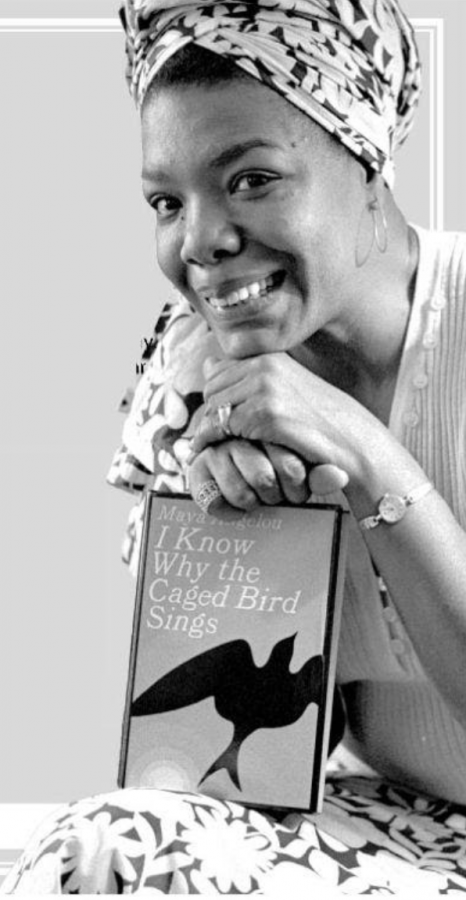Silenced Never Again
March 22, 2021
Her family would call her a troublemaker. Her son would agree. Her friends and colleagues would recognize her bravery, her passion, and her bold initiative. Maya Angelou led a career as a powerful poet and advocate for racial equality, a concept that would not become popular for twenty more years. Angelou was not only a writer, but a singer, dancer, actress, composer, and the first African-American director in Hollywood. It is no surprise that an ambitious spirit like hers would defy all set-backs and fight for freedom through writing and civil rights activism. Angelou was born in 1928 and passed away in 2014, but her legacy will not be forgotten.
Maya Angelou was not always outspoken. When she was young, she stopped speaking for five and a half years from childhood trauma. “I Know Why the Caged Bird Sings,” Angelou’s first autobiography, told the story of how her mother’s boyfriend sexually assaulted her as a seven-year-old. Angelou’s uncles took justice into their own hands and murdered him. However, the man’s death caused Maya Angelou more pain. She felt responsible. In coping with her emotions, Angelou stopped talking until Mrs. Flowers, a kind-hearted aristocrat, encouraged her to speak up again. Mrs. Flowers cared deeply for Angelou and often brought her books from different schools, knowing how much she loved to read. One day, when Maya was eleven, Mrs. Flowers told her, “You do not love poetry. You will never love it until you speak it. Until it comes across your tongue, through your teeth, over your lips, you will never love poetry.” These words resonated with Angelou, and before long, her passion for reading poetry convinced her to speak up. Angelou was never silenced again.
After listening to Dr. Martin Luther King Jr. giving a speech in Harlem, Angelou realized she too could use her voice against racial injustice, thus marking the beginning of her civil rights activism. Angelou worked for Dr. King as the Northern Coordinator of the Southern Christain Leadership Conference. While in this position, she planned and performed in a musical called Cabaret for Freedom to fundraise. When Dr. King gave his final sermon at Atlanta’s Ebenezer Baptist Church, he said, “If you want to say that I was a drum major, say that I was a drum major for justice” …Say that I was a drum major for peace. I was a drum major for righteousness.” The quote was later rephrased for a memorial in Washington D.C., reading, “I was a drum major for justice, peace, and righteousness.” Angelou knew Dr. King was a humanitarian who would have never spoken in a haughty manner, and she believed these edits neglected the intent of his message. Therefore, she relentlessly asked to have the quote fixed until it was finally taken down.
Guy Johnson, Maya Angelou’s son, wrote an article for the Caged Bird Legacy, elaborating on the lessons she taught him growing up. From a young age, Johnson knew that his mother was different because she stood up for her beliefs, even if doing so caused her to lose her job. “She would not suffer either prejudicial behavior or injustice in her presence without protest.” Johnson also remembers Angelou was not afraid to embrace African culture during the time of Jim Crow Laws; She wore African garb and called herself “black” when others chose to say “person of color.” There may have been disdain from others, but Angelou never succumbed to prejudice.
Recently, the Caged Bird Legacy announced that this year is the 50th anniversary of “I Know Why the Caged Bird Sings.” IKWTCBS has never experienced a year out of print! It has been sold globally and translated into many different languages; Angelou’s message has been read by audiences far and wide. It must be recognized that five more autobiographies follow IKWTCBS: (“Gather together in my name,” “Singin’ and Swingin’ and Gettin’ Merry like Christmas,” “Porgy and Bess; The Heart of a Woman,” “All God’s Children Need Traveling Shoes,” “A Song Flung up to Heaven”).
Although Angelou is well known for her autobiographies, her love for poetry cannot be forgotten. Her first collection of poems titled “Just Give me a Cool Drink of Water ‘Fore I Die” was published in 1971 and later nominated for a Pulitzer Prize. The poem “Phenomenal Woman” — with themes of strength and universal beauty — was featured in “And Still I Rise.” During the 2016 Olympics, Apple came out with a commercial that presented photographs to a recording of Angelou reciting “Human Family.” Not to mention, “On the Pulse of Morning” was written for President Bill Clinton’s Inauguration (1993); the last inaugural recitation took place more than thirty years prior (1961). Throughout her career, Angelou employed her talents to convey the value of freedom and respect. Angelou questioned stereotypes, advocated against discrimination, and taught others to rise and use their voice. She may have stirred up trouble, but according to her son’s article, in the best possible way.
“Out of the huts of history’s shame
I rise
Up from a past that’s rooted in pain
I rise
I’m a black ocean, leaping and wide,
Welling and swelling I bear in the tide.”
-Still I Rise, Maya Angelou
